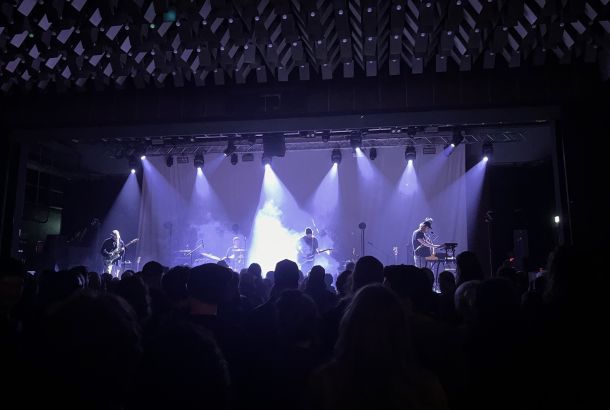Opinion: Sexism remains an issue in the music industry
By Lily Martin

It has become a topic of conversation that has disseminated across genres, styles, and continents, but remains scarily poignant: Do we have a deep-rooted issue with sexism in the music industry? And is that why women are struggling so much to break through into the charts and onto the stage?
The Independent reported this week that the USC’s Annenberg Inclusion Initiative has concluded that the number of women on the charts “remained stagnant at 17%”. Female songwriters contributed to just 12.3% of their field in a sample of 100 songs, and just 2.1% of songs had female producers.
Stacy Smith, lead author of the report and founder of the initiative, told Rolling Stone: “A lot of what we are seeing is just a rinse and repeat of last year. When you look at songwriting credits, you see almost 25% of the 700 most popular songs have 10 male songwriters attached. That means 10 men are setting the agenda for a quarter of the most popular content being distributed lyrically in the music space.”
These figures suggest that the under-representation of women in the music industry is an issue that can be seen clearly on a surface level. But the gender discrimination, stereotyping, and disrespect women face seems to run far deeper – arguably being partly responsible for issues of representation higher up.
Manchester isn’t exempt from this. The lack of female fronted bands in local line-ups is staggering, and gigs targeted at women in music highlight the massive disparity in opportunity between the sexes. Rarely do headlining or supporting female acts have the same level of public gravitas as their male counterparts, despite being equally as talented, hard-working, and capable. Female musicians may feel intimidated by their audience and ideals that they feel forced to uphold.
The more I speak to people, the broader the issue seems too. One front-woman of an up-and-coming indie band described how she once arrived at a popular Manchester venue to play a gig and was asked by the door staff which band her boyfriend was in. She also hates that a band being ‘female-fronted’ is now becoming a genre – “the Arctic Monkeys aren’t described as ‘male-fronted’ are they?”
An important point is made clear here: Are women in the music industry increasingly being defined by clear-cut roles and expectations about what they should be contributing to the scene?
There’s a plethora of female photographers, bloggers, journalists, and fans. But where are the female guitar techs? The female sound techs? The female tour managers? Is the music scene just one big ‘boys club’, where women are pushed into the margins to fulfill supporting roles for their male counterparts? And, essentially, is this why women are so under-represented — because they are dominated over by the men in the industry?
In my opinion, the severe problems we face in equal representation and opportunity for the genders stem back directly to a much wider lack of respect that lies beneath the surface. Many women in the music industry are exposed to being framed by stereotypes of their place, particularly in terms of the word ‘groupie’. In this one label, a woman is utterly demeaned by her male counterparts, and in many cases her female ones too.
So the question now becomes: Has all that much really changed since the emergence of the ‘fan-girl’ in the 1960s?
It’s certainly no secret that the music industry is considered a hidden hive of inadvertently sexist attitudes. The underground scene is potentially the worst. Here, archaic conceptions about how to treat women and mutual respect, irrespective of gender, reign supreme. Male musicians develop reputations for sleeping around, playing women against each other and an ethos of acceptance prevents anyone from speaking up for principles that should have been left in the 20th century.
Women are treated with little professional respect even in the roles that they embrace. There seems to be an expectation for women to dress for the men in the scene, and many female lead singers have voiced the pressure they face to be aesthetically synonymous with one-another, and to become an image of sexualisation and female promiscuity. This seems to be something that the music industry feeds on – the mistreatment and disrespect for women are shrugged off by labelling them as ‘groupies’ and even in some cases shrouded threats to their standing and opportunities within the industry are used to encourage and intimidate.
Women may even be forced to question whether they exacerbate their own situation as well.
Women rarely speak up against what they witness and experience, in part because they are numb to it. This degrades any hope of feminism in an industry that desperately needs it. Other women are perceived as threats to male attention – instead of criticising the behaviour of men as old-fashioned and outdated, we turn against each other and become defensive, defined by the company we keep and instinctively hostile against anyone who could jeopardise that. Men in the music industry remain painfully unaccountable for their flippancy and ill-judgement in their treatment of women, and this ripples out into wider opinions of the position of women in the scene.
Significant strides need to be made, particularly starting from the very roots of the music industry if we are going to establish any real change in the perception and success of female musicianship. It is vital that any change needs to be targeted at abandoning traditional concepts about whose responsibility it is to advocate equality, and stop using it as a beacon for ego development and to get laid.







